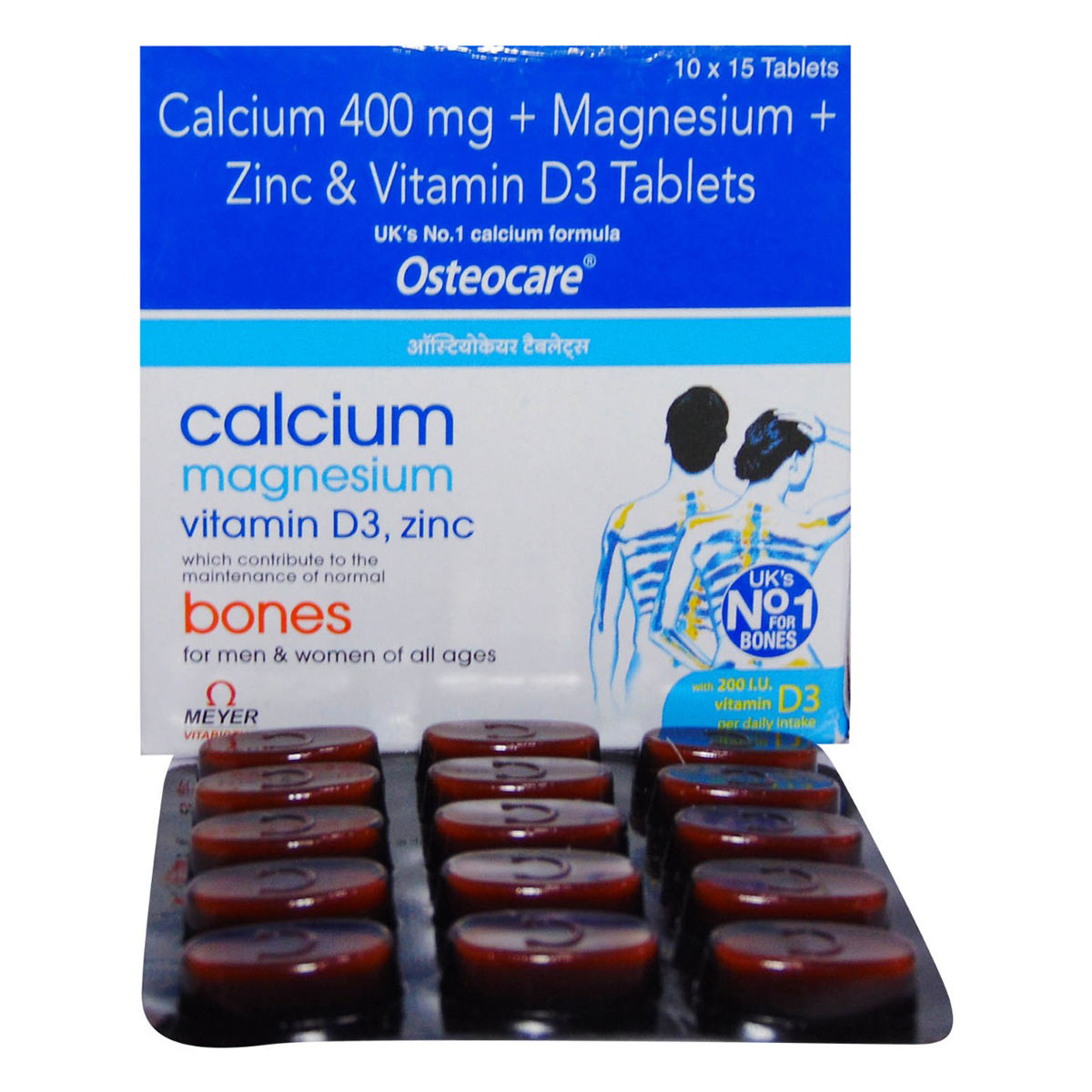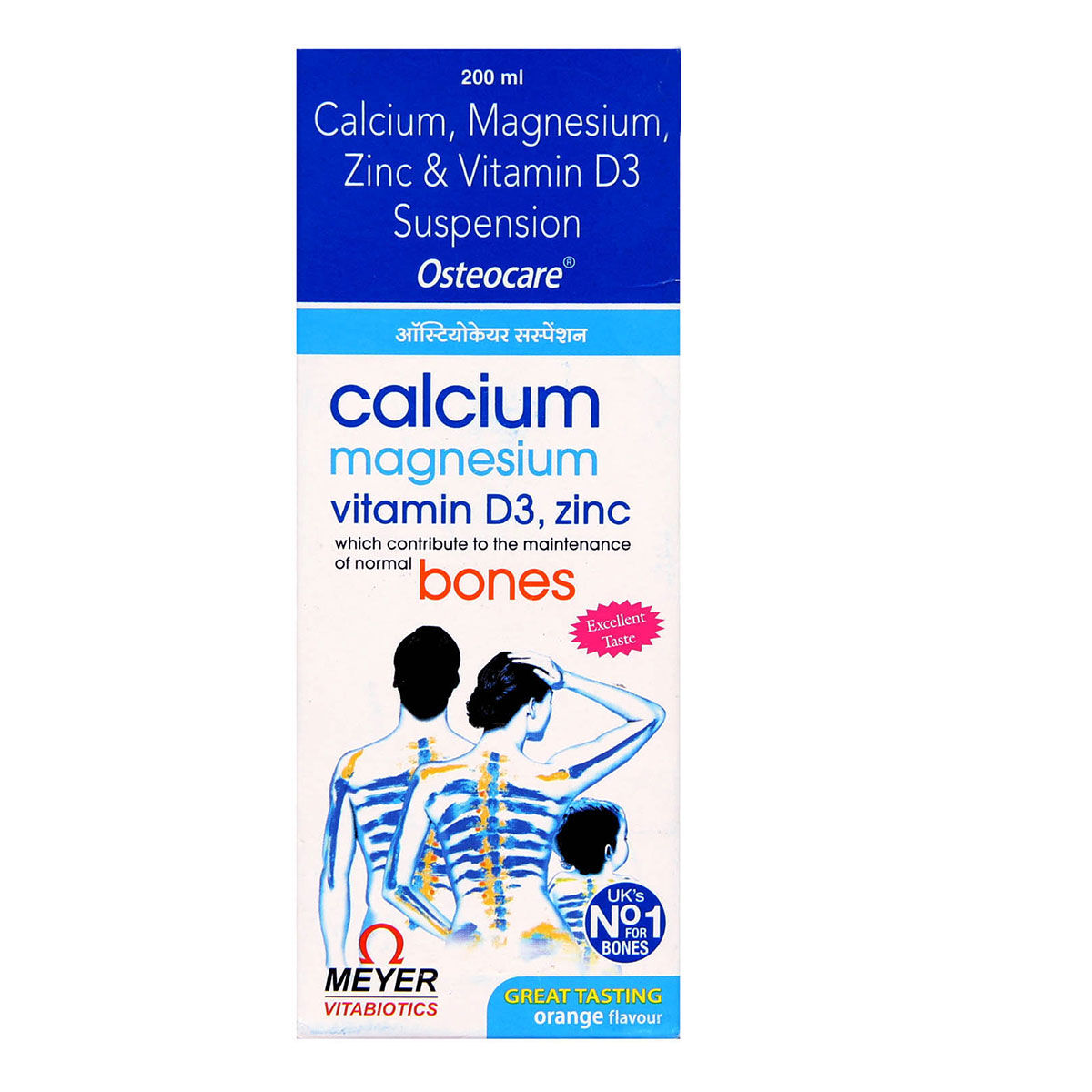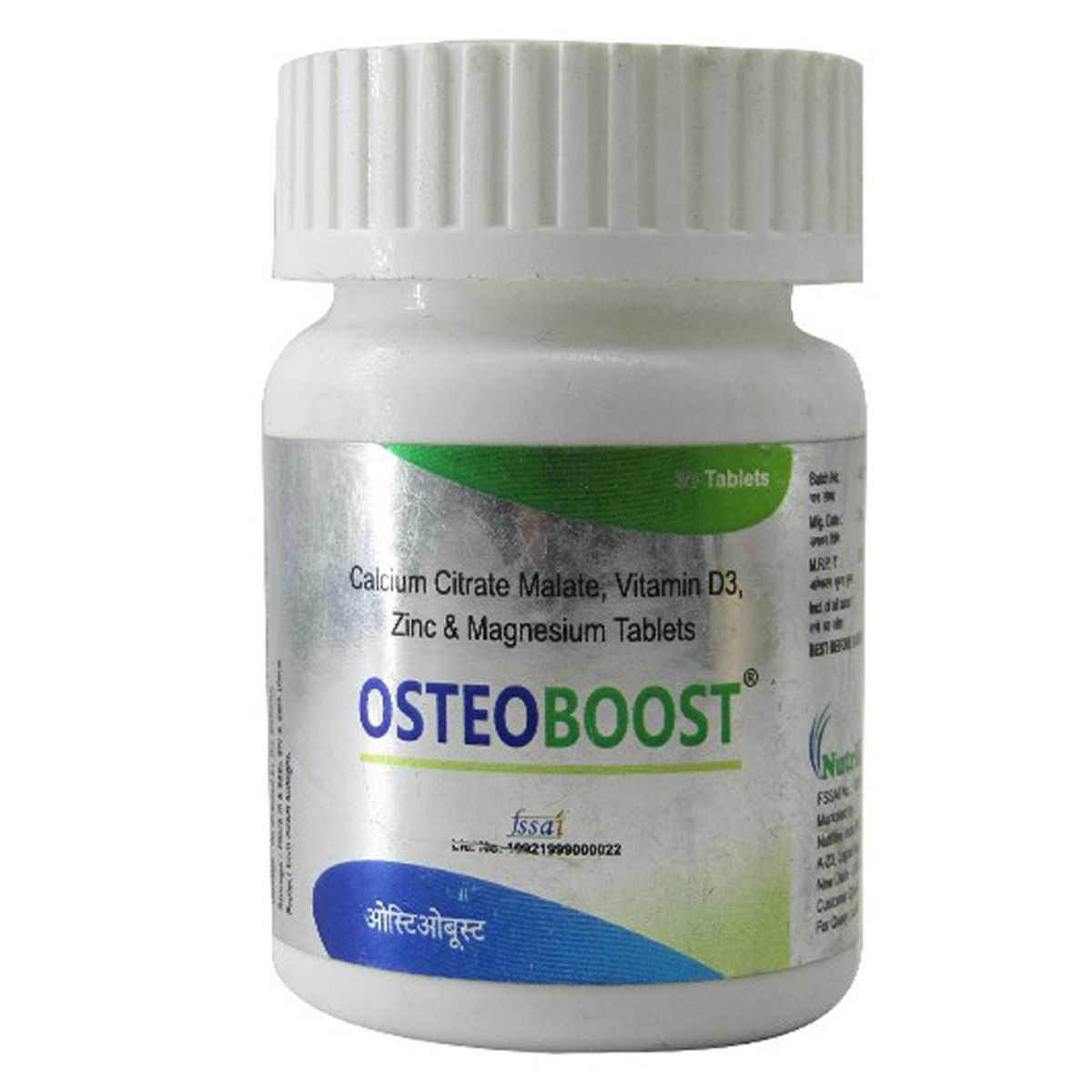Calcium+magnesium+vitamin D3+zinc
About Calcium+magnesium+vitamin D3+zinc
Calcium+magnesium+vitamin D3+zinc is used to treat and prevent nutritional deficiencies such as calcium and vitamin D deficiency. A nutritional deficiency occurs when the body does not absorb/get enough nutrients from food. Vitamins are necessary for body development and the prevention of diseases.
Calcium+magnesium+vitamin D3+zinc contains Calcium, vitamin D3, Magnesium and Zinc. Calcium makes bones stronger by increasing their density. It helps in treating and preventing low calcium levels. Vitamin D3 helps in the absorption of calcium. Magnesium aids in the absorption of calcium by converting vitamin D into its active form. Zinc is necessary for bone-building cells and inhibits the formation of cells that cause the breakdown of bones. Together, Calcium+magnesium+vitamin D3+zinc helps strengthen bones.
Take Calcium+magnesium+vitamin D3+zinc as advised by the doctor. In some cases, you may experience certain common side effects such as stomach upset, constipation, muscle weakness, nausea, and vomiting. Most of these side effects do not require medical attention and will resolve gradually over time. However, you are advised to talk to your doctor if you experience these side effects persistently.
Let your doctor know if you are taking any other medicines or herbal products before starting Calcium+magnesium+vitamin D3+zinc. If you are known to be allergic to any of the components, please inform your doctor. Consult your doctor before taking Calcium+magnesium+vitamin D3+zinc if you are pregnant or breastfeeding. Calcium+magnesium+vitamin D3+zinc should not be given to children unless recommended by a doctor. Avoid or limit consuming alcohol along with Calcium+magnesium+vitamin D3+zinc.
Uses of Calcium+magnesium+vitamin D3+zinc
• Avoiding Vitamin D Insufficiency: Calcium+magnesium+vitamin D3+zinc is frequently used to avoid vitamin D insufficiency in people whose vitamin D levels are affected by dietary limitations or inadequate sun exposure.
• Support for Bone Health: Calcium absorption, which is necessary to keep bones strong, is greatly aided by vitamin D. Calcium+magnesium+vitamin D3+zinc may lessen the chance of fractures by strengthening bones.
• Immune System Support: Having enough vitamin D may improve the immune system's reaction. The immune system can be strengthened by Calcium+magnesium+vitamin D3+zinc, particularly during flu season or when there is heightened vulnerability to infections.
• Nutritional Supplement: For people with higher iron needs, such as pregnant women and those following dietary restrictions, Calcium+magnesium+vitamin D3+zinc can be used as a nutritional supplement.
Medicinal Benefits
Calcium+magnesium+vitamin D3+zinc is a combination of four supplements: Calcium, Vitamin D3, Magnesium, and Zinc. Calcium+magnesium+vitamin D3+zinc is used to treat nutritional deficiencies, such as calcium and vitamin D deficiency. Calcium makes bones stronger by increasing their density. It helps in treating and preventing low calcium levels. Vitamin D3 helps in the absorption of calcium. Magnesium aids in the absorption of calcium by converting vitamin D into its active form. Zinc is necessary for bone-building cells and inhibits the formation of cells that cause the breakdown of bones. Together, Calcium+magnesium+vitamin D3+zinc helps in strengthening of bones and treats nutritional deficiency.
Directions for Use
- Calcium+magnesium+vitamin D3+zinc can be taken with or without food.
- Follow your doctor's instructions on the dosage and timing of this medication.
- Swallow Calcium+magnesium+vitamin D3+zinc as a whole with a glass of water.
- Do not crush, break, or chew it.
Storage
Side Effects of Calcium+magnesium+vitamin D3+zinc
- Stomach upset
- Constipation
- Muscle weakness
- Nausea
- Vomiting
Drug Warnings
Do not take Calcium+magnesium+vitamin D3+zinc if you are allergic to any of its contents. Inform your doctor if you have hypercalcemia (high level of calcium in the blood), hypercalciuria (excess calcium in the urine), nephrocalcinosis (excess calcium deposition in the kidneys), nephrolithiasis (kidney stones), hypervitaminosis D (excess vitamin D), severe renal impairment or renal failure. Consult your doctor before taking Calcium+magnesium+vitamin D3+zinc if you are pregnant or breastfeeding. Calcium+magnesium+vitamin D3+zinc should be given to children only if recommended by the doctor. Keep your doctor informed about your health condition and any medications you are taking to rule out any potential side effects or interactions.
Drug Interactions
Drug-Drug Interactions: Calcium+magnesium+vitamin D3+zinc may interact with anti-epileptic (phenytoin), corticosteroid (cortisone), diuretics, tetracycline/quinolone antibiotics, and cardiac glycosides.
Drug-Food Interactions: Maintain a gap of two hours between Calcium+magnesium+vitamin D3+zinc and foods containing oxalic acid and phytic acids such as spinach, rhubarb, and whole-grain cereals.
Drug-Disease Interactions: Calcium+magnesium+vitamin D3+zinc may have interactions with disease conditions such as hypercalcaemia (high level of calcium in the blood), hypercalciuria (excess calcium in the urine), nephrocalcinosis (excess calcium deposition in the kidneys), nephrolithiasis (kidney stones), hypervitaminosis D (excess vitamin D), malabsorption, severe renal impairment or renal failure.
Drug-Drug Interactions Checker List:
Safety Advice

Alcohol
consult your doctorAvoid consumption of alcohol while taking Calcium+magnesium+vitamin D3+zinc.

Pregnancy
consult your doctorPlease consult your doctor before taking Calcium+magnesium+vitamin D3+zinc if you are pregnant or have any concerns regarding this; your doctor will recommend it only if the benefits outweigh the risks.

Breast Feeding
consult your doctorIf you are breastfeeding, consult your doctor before taking Calcium+magnesium+vitamin D3+zinc.

Driving
safe if suggestedCalcium+magnesium+vitamin D3+zinc is unlikely to affect your ability to drive. However, drive or operate machinery only if you are alert.

Liver
consult your doctorPlease consult your doctor before taking Calcium+magnesium+vitamin D3+zinc if you have a liver impairment or any concerns regarding this.

Kidney
consult your doctorPlease consult your doctor before taking Calcium+magnesium+vitamin D3+zinc if you have kidney impairment or any concerns regarding this.

Children
cautionCalcium+magnesium+vitamin D3+zinc should be given to children only if recommended by the doctor.
Habit Forming
Diet & Lifestyle Advise
- Follow a well-balanced diet.
- Exercising regularly helps in improving overall health.
- Rest well, get plenty of sleep.
- Avoid smoking and alcohol consumption.
- Meditation and yoga can help lower stress.
- Avoid processed and fried food.
Patients Concern
Disease/Condition Glossary
Nutritional deficiencies: A nutritional deficiency occurs when the body does not absorb or get enough nutrients from food. Vitamins are necessary for body development and the prevention of diseases. Sometimes, your body is unable to absorb many nutrients even if you are consuming them. Nutrient deficiency can lead to many health problems, like a weakened immune system, skin problems, digestive problems, defective bone growth, and neurological diseases.
FAQs
Calcium+magnesium+vitamin D3+zinc belongs to the group of medicines called nutritional supplements used to treat and prevent dietary deficiencies, such as calcium and vitamin D deficiency.
Calcium+magnesium+vitamin D3+zinc contains calcium, vitamin D3, magnesium and zinc. Calcium makes the bones stronger by increasing their density. It helps in bone formation and maintenance. Vitamin D3 helps in the absorption of calcium. Magnesium aids in the absorption of calcium by converting vitamin D into its active form. Zinc is necessary for bone-building cells and inhibits the formation of cells that cause the breakdown of bones. Together, Calcium+magnesium+vitamin D3+zinc helps treat nutritional deficiency.
Calcium+magnesium+vitamin D3+zinc can be taken with antibiotics if advised by the doctor. However, maintain a gap of 2-4 hours between Calcium+magnesium+vitamin D3+zinc and antibiotics as taking them together might affect their absorption.
Calcium+magnesium+vitamin D3+zinc may cause constipation. Eat fibre-rich food and drink plenty of fluids if you experience constipation. Consult your doctor if you have severe constipation.
Avoid consuming foods containing oxalic acid and phytic acid, such as spinach, rhubarb, and whole-grain cereals, as they might inhibit the absorption of calcium. Maintain a gap of two hours between Calcium+magnesium+vitamin D3+zinc and foods containing oxalic acid or phytic acid.
Calcium+magnesium+vitamin D3+zinc can be taken with levothyroxine if advised by the doctor. Calcium might lower the effectiveness of levothyroxine; therefore, maintain a gap of 4 hours between Calcium+magnesium+vitamin D3+zinc and levothyroxine.
Foods rich in Vitamin D include certain fatty fish, such as tuna and salmon, as well as cod liver oil, egg yolk, and cheese. Vitamin D also comes from sun exposure. Thus, sun exposure at least two times a week for 10 to 30 minutes can help prevent vitamin D deficiency. If you still have any concerns, discuss with your doctor.
Due to our modern lifestyle, we spend most of our time indoors in air-conditioned homes, offices, and cars, with very little sun exposure. As a result, this increases Vitamin D deficiency in all age groups, leading to more muscle weakness and fractures. Several studies are being conducted that indicate Vitamin D may help prevent the onset of diabetes and cancers, such as breast and colon, and also help boost immunity.
The side effects of Calcium+magnesium+vitamin D3+zinc include stomach upset, constipation, nausea, vomiting and muscle weakness. If these side effects persist or worsen, please consult your doctor.








